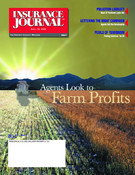By allowing this increase, the Department of Motor Vehicles (DMV) will be allowing an unnecessary burden on the California public, who would, eventually, be the ones paying for the increase.”
Those were the sentiments of Andre Urena, president of the Latin American Agents Assoc-iation (LAAA), in a letter written to the Office of Administrative Law (OAL) expressing his opposition on behalf of insurance agents and brokers to the proposed increase of fees to request driving records electronically.
The fee, which is currently set at the rate of $2 a record, was set to increase to $4 a record, effective April 1. The planned increase was to be in connection with an emergency regulation review of the California DMV.
Currently, the proposed regulation has been withdrawn indefinitely. A decision is expected within the next couple of weeks as too whether or not further action will be taken.
Sources who agreed to speak with Insurance Journal off the record stated that the primary reason for the increase of fees is to add to the general fund for the state of California, which has become dangerously low, primarily because of the energy crisis. The fees would be used to replenish the fund.
The doubling of fees, according to the anonymous sources, appalls both agents and consumers. Insurance companies have expressed their opposition to the implementation of the fees under the guise of emergency regulation, which allows a fee to be put in place in a short time period, instead of the usual 45 days.
Agents are asking, “Where’s the emergency?” as they struggle to adjust their budgets for the impending increase.
Urena opposed the increase because of the necessity the records play in the underwriting process, assessing the risk of insuring clients. The rate hike would bring upon more cost to the agents, which would be passed on to the consumer.
“The reason we got involved was because the driver records have always been something that all of us are constantly using everyday. Not only do we as brokers and agents use it on the retail side, but then the insurance company pulls it again. So it is a definite cost that is there and it’s permanent.”
Urena noted that it is not only the insurance agents who will be affected by the increase. Auto dealers also have to access records for trade-in vehicles, and would also be passed on to consumers.
“When the DMV arbitrarily decides to make that increase, I don’t think that they are aware of the effect that it would have on the community. It is something that definitely not only affects agents and brokers, but ultimately it is the consumer that gets affected by it because the increase, they pass it along to the consumers. And typically, the consumers that we deal with in the non-standard auto are the people that are less fortunate and have less money. So it’s a definite impact to our community.”
A 1997 report released by a California State Auditor stated that the DMV overcharged customers for driving record information, as they found the actual cost to the DMV to provide records to be at $.50 per record, collecting a $1.50 profit per record. The report stated: “We estimate that, over the past six fiscal years, the department has generated an average profit of $16.5 million per year from sales of registration and licensing information.”
The increase in fees would raise that profit to $3.50 per record.
Additionally, Urena argued in the letter that the profit made from fees should be considered a tax, because it is revenue generating. He pointed out that “doubling a fee that generates additional revenue is the same as doubling a tax. Doubling a tax without the two-thirds majority vote required by Proposition 13 is illegal.”
“It obviously upsets the community because then they have to increase the money that they charge the consumer; it always looks like the agents fee. That’s their main concern,” he added.
When contacted, the DMV could only confirm that the fee had been withdrawn, stating that the proposal was still under review.
Was this article valuable?
Here are more articles you may enjoy.


 Q4 Global Commercial Insurance Rates Drop 4%, in 6th Quarterly Decline: Marsh
Q4 Global Commercial Insurance Rates Drop 4%, in 6th Quarterly Decline: Marsh  Insurance Issue Leaves Some Players Off World Baseball Classic Rosters
Insurance Issue Leaves Some Players Off World Baseball Classic Rosters  BMW Recalls Hundreds of Thousands of Cars Over Fire Risk
BMW Recalls Hundreds of Thousands of Cars Over Fire Risk  Pipeline Explodes at Delfin LNG Planned Project in Louisiana
Pipeline Explodes at Delfin LNG Planned Project in Louisiana 


